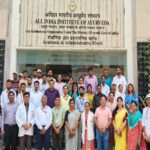Representational Image
The number of Alzheimer’s patients in India will triple by 2050
New Delhi, May 30, 2018: A study conducted by researchers at the University of Utah Health have come up with the theory that music-based treatments could be used to alleviate anxiety in patients with dementia. Music may help tap into the salience network of the brain that is still relatively functioning. The need of the hour is to create awareness on alternative treatment for Alzheimer’s.
Music activates the brain, causing whole regions to communicate. By listening to the personal soundtrack, the visual network, the salience network, the executive network and the cerebellar and corticocerebellar network pairs all showed significantly higher functional connectivity.
Speaking about this, Padma Shri Awardee Dr K K Aggarwal, President, Heart Care Foundation of India, said, “Alzheimer’s causes severe memory recall issues, and progressive damage to their brains impairing other cognitive functions as well. This can lead to a state of anxiety and disorientation in many people but listening to music can prove beneficial. Music can relieve stress, reduce anxiety and depression, and reduce agitation. Apart from aiding memory in those with Alzheimer’s, music can also benefit caregivers by reducing their anxiety and distress. It helps lighten the mood and provides a way to connect with loved ones who have Alzheimer’s disease by easing communication. Music is like an anchor, grounding the patient back in reality.”
India has an ever-growing elderly population, out of which 1.6 million are suffering from Alzheimer’s. This number is only expected to triple by 2050.
Adding further, Dr Aggarwal, who is also the Group Editor of IJCP, said, “It is important that you engage in regular mentally stimulating activities to keep those brain cells up and running. This is particularly beneficial for those who have crossed their 40s. Try doing light brain stimulating tasks like crossword puzzles, quizzes, daily reading or anything similar that interests you. For older individuals, it is advised that they engage their mental reserves through social engagement and exercise.”
Some tips from HCFI
- Maintain a healthy weight. Check your waistline.
- Eat mindfully. Emphasize colorful, vitamin–packed vegetables and fruits; whole grains; fish, lean poultry, tofu, and beans and other legumes as protein sources plus healthy fats. Cut down on unnecessary calories from sweets, sodas, refined grains like white bread or white rice, unhealthy fats, fried and fast foods, and mindless snacking. Keep a close eye on portion sizes, too.
- Exercise regularly. Aim for 2½ to 5 hours weekly of brisk walking (at 4 mph). Or try a vigorous exercise like jogging (at 6 mph) for half that time.
- Keep an eye on important health numbers. In addition to watching your weight and waistline, keep a watch on your cholesterol, triglycerides, blood pressure, and blood sugar numbers.
- Earlier clinical trials reported in up to date have found that exposing patients to music for 15 to 20 minutes prior to and/or during a procedure reduces anxiety levels in samples of patients undergoing various procedures like colposcopy, cystoscopy and gastrointestinal; cesarean delivery; mastectomy; port catheter placement, day surgery, flexible cystoscopy; and hysteroscopy.
- An observational trial in patients awaiting surgery found that patients’ subjective reports of decreased anxiety were consistent with heart rate variability, an objective marker of anxiety.
- Music did not show a benefit during endoscopy in a trial of patients under conscious sedation.







